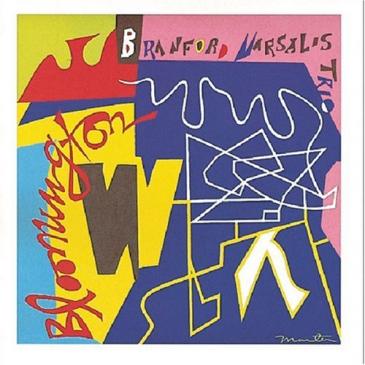
Bloomington
Tracks
Musicians
Other credits
Produced by Delfeayo Marsalis
Executive Producer Dr. George Butler
Recorded by Patrick Smith
Recorded September 23, 1991 at Indiana University Auditorium, Bloomington, IN
About the Album
Bloomington
No one expected anything unusual was about to happen that night. After all, Bloomington, Indiana, is the bucolic home of such latter-day Americana as basketball coach Bobby Knight, as well as the backdrop for the film, "Breaking Away." But something unusual did happen that autumn night: the Branford Marsalis trio turned in a performance for the ages, now thankfully preserved in Branford's new Columbia album, BLOOMINGTON.
Just before Branford achieved national celebrity status last year as the new musical director for "The Tonight Show," the saxophonist, embarked on an exhaustive U.S. concert tour. One of the many stops along the way came at Indiana University on September 23, 1991. "Whenever you have the opportunity to document your performances, you do so," notes Branford. "We were making the film The Music Tells You at the time, and I knew the best gigs are often those in the more remote places. So I said, 'turn on the tape and record the whole show.'"
And what a show. Produced by Delfeayo Marsalis and recorded by Patrick Smith direct to DAT digital, BLOOMINGTON captures the intense give-and-take of three master musicians testing each other's mettle. Three of the six pieces on the album - "Xavier's Lair," "The Beautyful Ones Are Not Yet Born," and "Citizen Tain" - were written by Branford. Also included are the Robert Hurst's original "Roused About" and the Thelonious Monk classic, "Friday the 13th."
Words cannot adequately convey the supple power of the music contained in BLOOMINGTON. The six pieces seem to meld together into lengthy jazz rages, where precise key and strict tonality are secondary; where harmonic, melodic, and metric conflict is deliberately sought and ultimately resolved; where individual virtuosity is an expression of collective musical consent. That this occurs spontaneously in a concert setting makes BLOOMINGTON all the more astonishing.
Says producer Delfeayo Marsalis, "The test of any ensemble is its ability to achieve maximum sound with what you have to work with, in this case three instruments. The trio's collective ideas, the spontaneity, creativity, and fresh approach to rhythm, melody, and improvisation make this, in my opinion, the most incredible concert recorded n our generation. This is clearly Branford's most important record. Adds Branford, "My message to the audience is, "We're going on a ride, guys. Why don't you take a seat, strap yourself in, and hold on.'"
At the time of this recording, Marsalis, Hurst, and Watts had been working together as a trio for less than a year, following the departure of pianist Kenny Kirkland. "At first it required we throw out the book," recalls Branford. "Songs that work well in quartet don't always work in a trio." Aside from the fine-tuning, the three long-time friends quickly took to the new configuration. "Much of what makes our music work is our humor," says Branford. "I've been criticized by some who thought we were rude because we were laughing on stage and didn't let the audience in on the joke. How could we? The humor comes out of obscure musical cross-references. Once it happens it's gone. And if we stopped to explain the joke, nobody would get it.
Maybe not, but certainly more and more people over the past few years have been getting serious about the art of Branford Marsalis. The sheer breadth of his musical diversity makes it difficult to pin him down. His collaborations with Sting, the Grateful Dead, Gangstarr, the English Chamber Orchestra, Bruce Hornsby, B.B. King, his contributions to such film scores as "Mo' Better Blues," and "Sneakers," and of course his "Tonight Show" and solo work, have made him a multiple threat in pop, rock, classical, blues, as well as jazz.
As an improvizationalist, Marsalis has few equals, but he's quick to anchor to the bylaws of the esteemed form. In the 1992 Sony Music Video film by D.A. Pennebaker, The Music Tells You, he says, "true freedom comes only in structure. There is no freedom in freedom. The music tells you what you can play."
With his new found prominence on the "Tonight Show," Branford's engaging personality and razor-sharp wit have found a nightly nationwide audience. In addition, his network gig has provided perhaps the most important forum for jazz in the history of music. Throughout his tenure on the show, Branford has sought to expose legends of jazz and promising newcomers, as well as lead the best band on television. So great is his dedication, despite the rigors of a five-night-a-week grind, Branford continues to create challenging music of breathtaking originality.
Which leads us back to BLOOMINGTON. There will be people who claim that, by virtue of Branford's powerful position in the public eye, this album redraws the boundaries of contemporary jazz, and elevates the discipline of improvisation to acrophobia heights. But Branford himself will have none of it. "Records should be judged by musical content alone, and not by visibility. This shouldn't be a landmark album because people know who I am, but only if it stands the test of time. I won't make that kind of proclamation."
He's right. The platitudes must originate elsewhere, from those who value artistry, who celebrate the uncanny creativity of the human spirit, and who really dig jazz. For them, Branford Marsalis and his music indeed break new ground while remaining ever respectful of the traditions of the past. For them, Branford's efforts make singular sense.
One more thing. At the tail end of BLOOMINGTON, Branford bids farewell to his audience with the words, "Hope we didn't confuse you too much." Say what??? If nothing else, BLOOMINGTON is a paragon of clarity. But you already knew that.